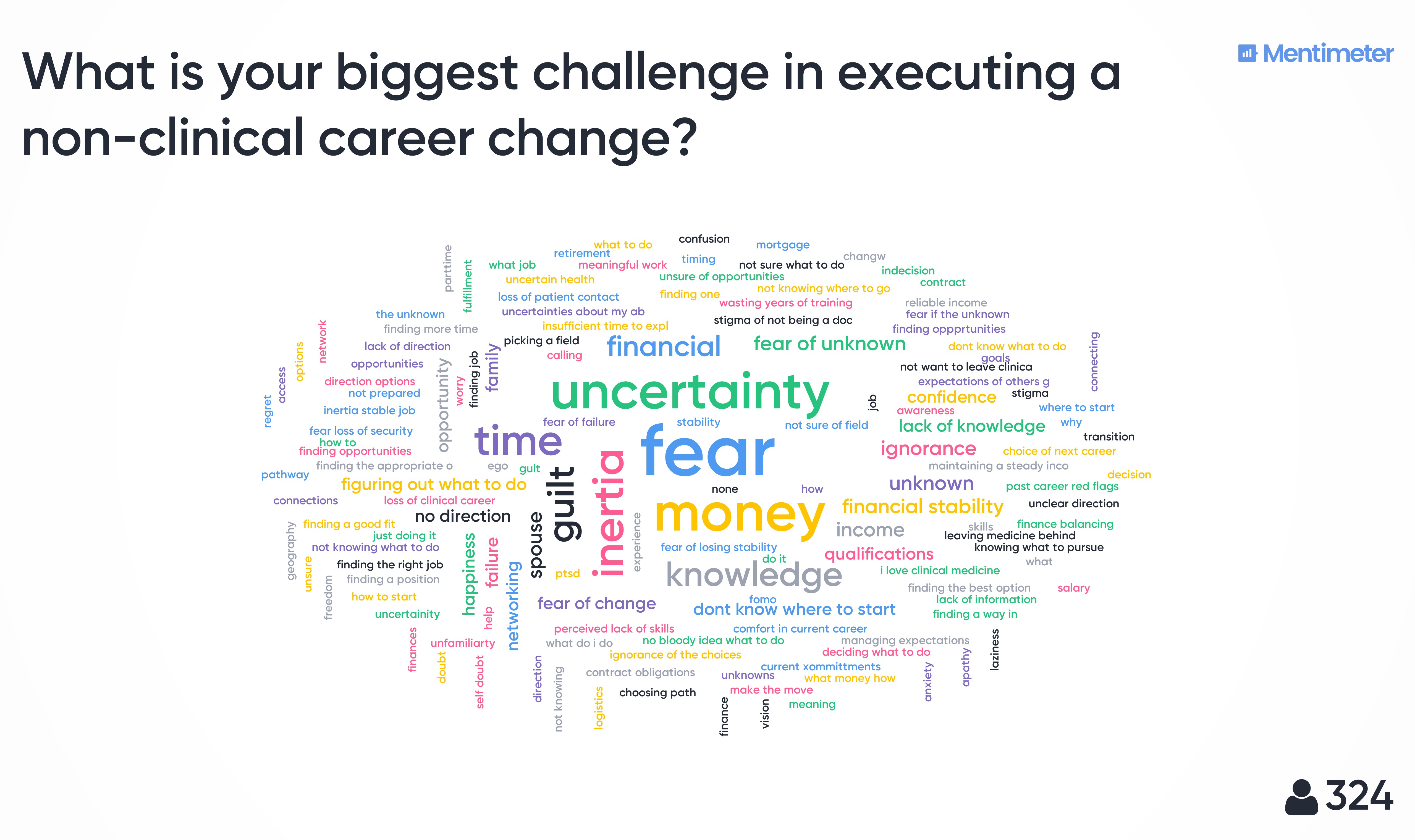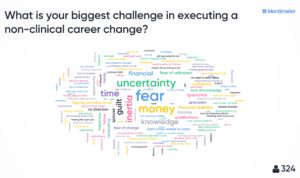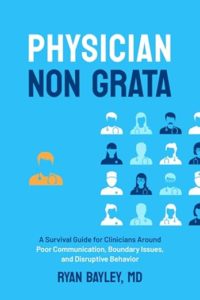Overcoming The Challenges To Physician Career Change

Closing The Gap Blog – October 2019
This last week I had the wonderful opportunity to do the opening keynote for SEAK 2019. For those of you unfamiliar, SEAK is the largest national conference for physicians looking for non-clinical career changes.
To break the ice in my talk, I had everyone in the audience answer a simple question – “In a word or two, what is your biggest challenge in executing a non-clinical career change?” Those answers generated the following word cloud (the more people who put the same word, the larger that word appears):

The largest challenge? FEAR.
Followed by money, uncertainty, inertia, guilt, and time. And looking at most of the other answers in the cloud, they are all variations on these key themes.
What I find most telling about this cloud created by 400 real physicians just like you and I is that while the practical challenges of money and time are there, most of the top challenges are actually internal barriers. They are the emotional and existential battles within ourselves that get the best of us and derail our desire for meaningful change in our work.
And I find in my work with physicians in career transition is that most of the challenges are rooted in two core physician attributes that most of us picked up along the way – an intolerance of uncertainty and a strong professional identity.
Intolerance of Uncertainty
As physicians in training, we did not have to deal with much uncertainty. From the moment we decided to become physicians we knew exactly what we needed to do, and when. We had a road map and structured processes for getting there. And as long as we jumped through the hoops put in front of us, the outcome (becoming an attending) was guaranteed.
In contrast, mid-life career transition, by its very nature, is uncertain and ambiguous. It requires us to leave the safety of what we know and venture into the new. We have to enter a period where we have a foot in both worlds, where we feel contradiction and pulled in multiple directions as we test new possibilities and reformulate our selves. Research in career transition also tells us that this uncertainty is likely to be with us a long time through our transition, and will likely intensify as we start to take more and more committed action.
And this is ok. This is normal. It is not what we experienced when we became physicians, its not how our day to day as clinicians works, but that does not make it wrong.
Because if we don’t do this the alternative is to spend our time and energy trying to eliminate uncertainty, rather than focusing on making change. We get headstuck, delaying taking action until we are certain of the destination. And thus we procrastinate in perpetuity forever stuck
Or if we do manage to take action, our intolerance for uncertainty may still get the best of us, make us less creative, less generative in our search, and cause us to settle on the first possibility to come along, only to find that for all of our efforts we are not really satisfied with our new career either.
Professional Identity
The second roadblock to change is our professional identity. Professional identity is the attributes, beliefs, values, motives, and experiences of what we think it means to be a physician. And what’s amazing about professional identity is how little of it we are consciously aware of. We might say, at a conscious level, I am a doctor, but beneath that is countless rules, cultural norms, benchmarks for success, and acceptable behaviors that we have been collecting since day one of medical school so that we can act in a way that makes us a member of this group called doctor.
And it plays havoc with our minds. Our strong professional identity is why we find our inner critic whispering all those messages as to why we shouldn’t change – because we’ve been socialized that leaving is wrong.
Thus to succeed in career change, we have to remember ourselves. This is hard because in many ways, because remembering ourselves is antithetical to being a doctor. After all, being a doctor is self-sacrifice, self-denial, self-degradation, self-effacement.
You assume the role of the doctor, and you wear that mask for so long, you cant tell the difference between the role you play and who you are. But is important to remember that no matter how long you have played the role of being a doctor, there was a time in life your life when that label was not true. But you were still you. And for that matter, there will be a time in your life when it is no longer true, and yet you will still be you.
The point is as you go through life, your body changes, your thoughts change, your feelings change, your roles change, but the “you” that’s able to step back and notice or observe all those things never changes. The truth is that there is you the doctor, and all of the labels, beliefs, rules, judgments, and images that come with that role, But there is also a more transcendent self – a point of view from which we can notice the roles we play. And this deeper self has always been there since before you were a full-time clinician and will be there long after no matter what your career looks like.
It’s this deeper self that has navigated all of the successes and challenges of your life. It is a more resilient and pluripotential you, the one that chose to become a doctor, but also the one that can chose to be anything.
And when we can remember that we are so much more than our professional identity, and when we can make space for the inevitable uncertainty that shows up as we explore new options, we can more easily navigate the emotional landscape of career change. After all, it is not the practical challenges that ultimately determine whether we succeed in transitioning to new opportunities or get stuck. Rather, it is how we navigate the internal thoughts and feelings that show up and tell us all the reasons not to make a change.
And if you find yourself getting stuck in this regard, our coaching will help you get unstuck and start moving in the direction of meaningful changes that will lead to greater career satisfaction. Schedule an introductory coaching session today and let us help you!
 One instance of being labeled a poor communicator, uncivil, or disruptive can wreak havoc on your career.
One instance of being labeled a poor communicator, uncivil, or disruptive can wreak havoc on your career.